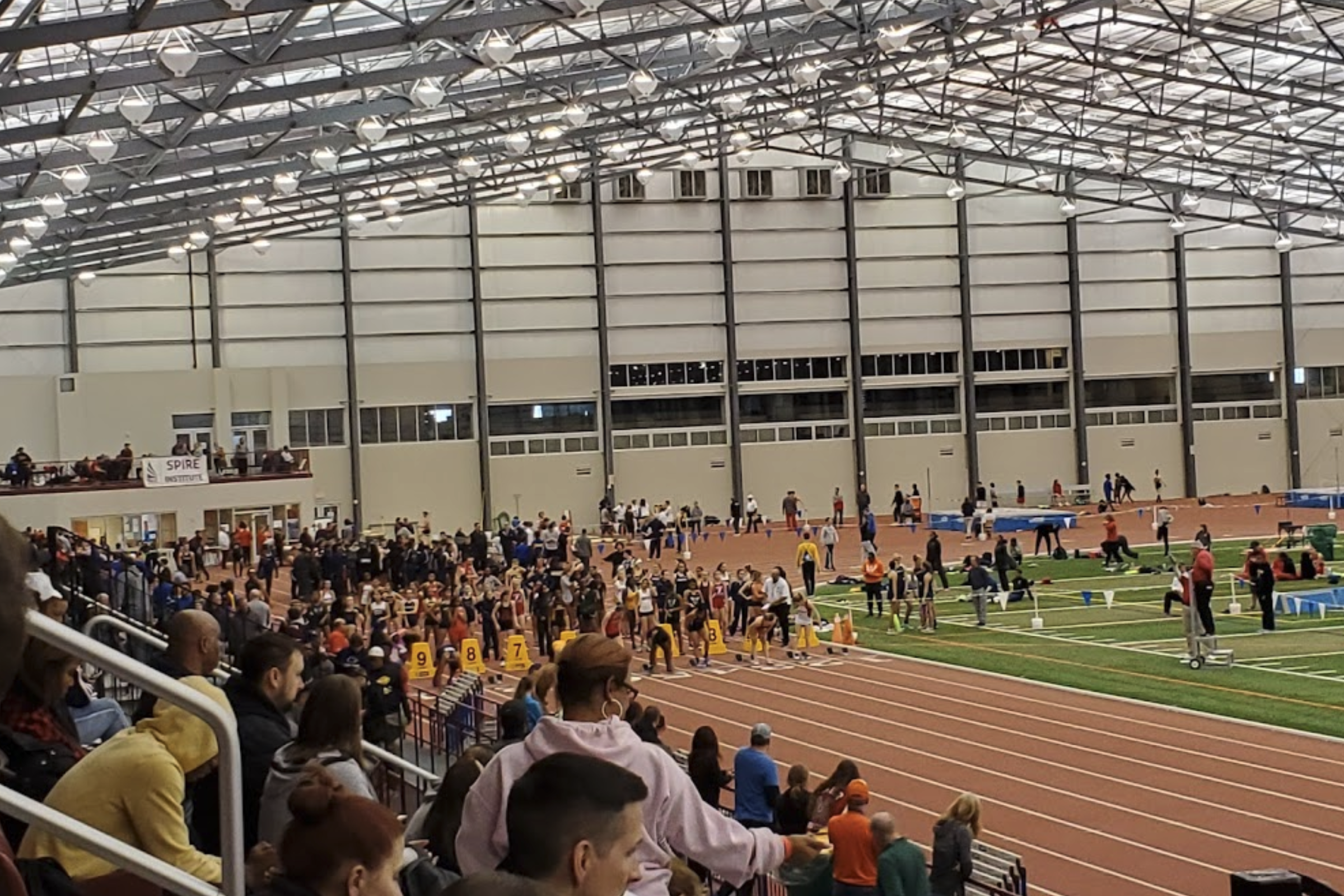Ohio Sports Complex with a Boarding School Files for Sports Betting Licenses
Posted on: July 19, 2022, 12:20h.
Last updated on: January 30, 2023, 01:42h.
The majority owner of a northeast Ohio sports complex told Casino.org on Tuesday that the boarding school for elite-level teenage athletes located at the site will not have anything to do with the organization’s plans to host a retail sportsbook and mobile sports betting app.

Advocates for responsible gaming practices and others who have raised concerns about expanding gambling are skeptical about those claims and question whether such an organization should be involved in sports betting.
On Friday, Geneva Sports LLC, which operates as SPIRE Institute, filed applications with the Ohio Casino Control Commission (OCCC) to partner with an online sports betting operator and a retail sportsbook. In both instances, SPIRE seeks to work with Out the Gate, a newcomer to the sports betting industry.
Located 45 minutes northeast of Cleveland in Geneva, SPIRE bills itself, according to its website, as “A world-class event and wellness complex.” Among the facilities at the 800-acre site is a multipurpose stadium the organization said can host events in a “national championship setting,” with seating up to 20,000.
The institute also offers training programs for Olympians, professional athletes, and Paralympians and Wounded Warriors. It has hosted college championship events, including this year’s NCAA Division III Track and Field Championship. It also organizes basketball and soccer leagues ranging from AAU-caliber talent to adult recreational players.
SPIRE also hosts the SPIRE Academy, a boarding school where high school students and recent grads can hone their athletics skills to reach the next level. Among the sports, the school fields teams include basketball, soccer, swimming, track & field, and wrestling.
Helping athletes in their development is a team of ambassadors that include Olympic gold medal swimmers Ryan Lochte and Caeleb Dressel, as well as NBA legend Dikembe Mutombo.
SPIRE Says It Understands Responsibility
Jonathan Ehrenfeld, a Baltimore-based entrepreneur who serves as the managing partner for the SPIRE Institute, told Casino.org that a recent study found the Ashtabula County complex generates an annual economic impact of $95 million. Whether they’re visiting the institute, local wineries, or recreational areas, tourism is a major economic engine of the area.
“We feel like having a sports gaming option for them somewhere nearby would be just another activity that could be interesting and inviting and exciting for somebody that wants to participate,” he said. “We want to be able to offer different kinds of activities as part of our offering.”
If approved for a retail sportsbook, Ehrenfeld said that it would be located off-campus. It would also feature security measures to ensure no one under 21, the legal age to bet on sports in Ohio, would be able to get in and place bets.
Ehrenfeld added that SPIRE also has a liquor license that allows them to serve on-site. That’s used for weddings, receptions, and other events the facility holds. But alcohol is not sold at youth sporting events.
There are certain licenses that the state gives out, such as a liquor license, that you just have to be responsible with,” he said. “We have a liquor license and we have a high school, but those two don’t conflict because of responsible management and never have, really, in SPIRE’s history.”
SPIRE’s also not the only entity connected with youth sports that are applying for a sports betting license in Ohio. MLS teams FC Cincinnati and the Columbus Crew run academy soccer programs to identify teenage athletes who may be able to play at the college, professional, and even the international level. HOF Village Newco in Canton is a mixed-use development around the Pro Football Hall of Fame that hosts youth football, soccer, and lacrosse events.
Fears About Exposing Students
On Monday, responsible gaming proponents told Casino.org that an organization that runs a high school should not be involved in sports betting. For starters, they said the association between the academy and a sportsbook raises concerns about exposing and normalizing the product to kids who cannot legally bet.
Brianne Doura-Schawohl, a consulting firm focused on promoting responsible gaming practices, said it doesn’t matter that wagering won’t be offered on high school games.
The point is, is that they’re bringing the product that lawmakers and policymakers have tried to keep away from youth sports now directly into the lives of youth,” she told Casino.org. “Just by nature of becoming an operator. The business is happening around them, and this really isn’t a business that’s appropriate for children. We know that it can have significant consequences on their mental health and their overall well-being.”
James Syphax is a community prevention manager for the Prevention Action Alliance, a Columbus, Ohio-based certified prevention agency that works on several responsible gambling initiatives. He said he knows of several universities that prohibit alcohol advertising on their campuses to limit exposure to underage students.
The same concerns apply to sports betting as they do with beer and liquor.
“We want people to set limits to gamble, to gamble responsibly, but of course, that means legally,” Syphax told Casino.org. “So, we wouldn’t want any of our young people under the appropriate age to engage in gambling activities. And going back to that access and availability piece, it just does not possibly seem like the best fit.”
Ehrenfeld insisted, though, that it would be “impossible” for any of SPIRE’s students to engage in gambling.
There will not be a window of opportunity for them,” he said. “The types of measures that are going to be in place will be impenetrable. You’re not going to have an opportunity for a 17-year-old kid to walk in and engage in gaming. It’s just not going to happen.
“We take it very, very seriously. So much of what we do here at SPIRE is geared toward building our brand, building on our reputation. We’re not going to stand for any type of flexing of the rules.”

National Council on Problem Gambling Executive Director Keith Whyte said that in addition to the underage exposure risk, there are other concerns with having a sports betting operator tied closely to an organization that runs a school.
The implicit assumption that maybe if you patronize their sportsbook versus FanDuel’s, you’re helping kids… a lot of gambling is marketed this way,” Whyte said. “Lotteries are explicitly marketed to benefit education, which is, of course, in a lot of cases youth education, and we think that’s a that’s a pretty poor way of justifying gambling.”
High school students, though, aren’t the only ones at risk. Doura-Schawohl added that seeing the NCAA and the Department of Veterans Affairs listed as SPIRE partners also raises concerns. Those organizations have members who also are at high risk of developing problem gambling behaviors.
Even if firewalls or policies are in place, she said it’s impossible to keep academic and athletic pursuits completely separate from the sports betting venture, they claim.
“Not having ever spoken with them, I would encourage, and I could only hope that they are going to be equally – if not more aggressive – in their pursuits for protections for their current clientele,” Doura-Schawohl said. “Because it will have an impact. It will be felt. Their new business will have a trickle-down impact on the people they currently serve.”
Ehrenfeld said that SPIRE currently does not offer any gaming education for its students or others who use its facilities. However, he believes there will be opportunities for that if the licenses are approved.
“I think it could be beneficial because we are seeing this kind of emergence of sports gaming, and I think there’s a way for it to be a contributor to society,” he said. “But, of course, there’s the dark side, which we all want to avoid.”
Advocate Calls for Pulling Application
Les Bernal, executive director of Stop Predatory Gambling, said that he was shocked that an institution that’s supposed to educate children would want to venture into sports betting and urged SPIRE to withdraw its application.
“They need to live up to the mission of what an educational institution is supposed to be about,” he told Casino.org. “That’s not supposed to be about greed.”
Back in 2019, Bernal testified before Ohio lawmakers. He claimed then that studies from Great Britain showed the impact of repeated gambling and placements for gambling affected how minors viewed sports. That exposure also made them more likely to become betting customers when they turned the legal age. It also made them more susceptible to developing problem gambling behaviors.
He reiterated that on Monday.
“It’s the idea that commercialized sports gambling is normal for these young people,” Bernal said. “It’s a very dangerous activity for people of all ages. That’s why the American Psychological Association rated or deemed gambling addiction at the same level as an addiction as cocaine and heroin when they released its (Diagnostic and Statistical Manual of Mental Disorders)-5 in 2013. This is a dangerous and harmful product, and it has no business being exposed to young people.”
Why SPIRE is Eligible to Apply
The focus on Ohio sports betting has been on professional sports teams and the state’s casinos and racinos having access to licenses. But the law legislators passed last December has a more expansive definition for who can partner with a sportsbook or online operator.
Under the definition of “Type A sports gaming proprietor,” which is the online license, the sports betting law states one of the following criteria must be met: they must either operate a “Type B” retail sportsbook or they must have at least one established business in the state that “regularly maintains multiple employees.”
Sports teams, venues hosting major professional events like Muirfield Village Golf Club, casinos, and racinos are given “preference” for licenses by the OCCC under the law.
The law also states that Type A and Type B applicants — and SPIRE is seeking both — will be considered based on eight factors. They entail “reputation, experience, and financial integrity”; ability to pay for insurance policies and surety bonds; previous gaming compliance experience, affiliates included; past criminal history; previous bankruptcies; tax delinquencies; litigation history; and “whether awarding a license would undermine the public’s confidence in the sports gaming industry in this state.”
According to Jessica Franks, the OCCC’s director of communications, the fee to apply for a Type A, or online sports betting proprietor license, is $150,000. The fee for the Type B retail proprietor license is $20,000. If approved, the cost for a five-year license to host online sports betting app would be $1.5 million and $140,000 to host the retail sportsbook.
Entities that applied by Friday – if the OCCC approves them – will be eligible to offer sports betting beginning on the Jan. 1 universal start date.
Franks told Casino.org Tuesday that commission investigators will conduct background checks on the applicants as part of the review. The commission will then receive a recommendation on whether to approve or deny a license application.
If an application is denied, Franks said the applicant will have the right to request an appeal before an “independent hearing examiner.” That examiner would then draft a report, and the OCCC would act on that.
Related News Articles
FanDuel to Be New York Yankees Official Sports Betting Partner
Australia’s Betr Sportsbook Comes up Lame with Melbourne Cup Bettors
Disney CEO Bob Iger Lukewarm on Sports Betting
Most Popular
LOST VEGAS: The Foster Brooks Robot at MGM Grand
Bally’s Sets Date for Tropicana Las Vegas Implosion & Party
Most Commented
-
VEGAS MYTHS RE-BUSTED: You Don’t Have to Pay Resort Fees
— August 2, 2024 — 16 Comments -
VEGAS MYTHS RE-BUSTED: Elvis Was a Straight-Up Racist
— August 9, 2024 — 11 Comments -
ANTI-SOCIAL BEHAVIOR: Vegas Casino Buffet Stunt in Poor Taste Goes Viral
— August 16, 2024 — 7 Comments -
VEGAS MYTHS RE-BUSTED: The Strip Tried Appealing to Families and Failed
— August 23, 2024 — 7 Comments
















No comments yet